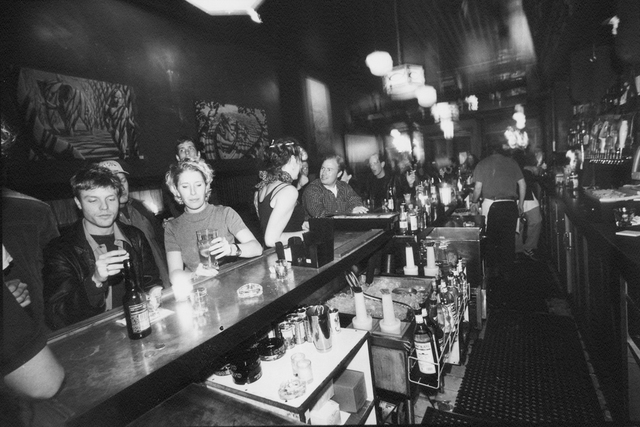According to one of Whit Stillman’s genteel boogiers, disco “is everything I’ve ever dreamed of: cocktails, dancing, conversation, exchange of points of view.” Turns out disco is a Cary Grant movie! And here we thought it was heaving half-naked bodies, red-nosed trips to the restroom, and lots and lots of Eurotrash. In The Last Days of Disco, the mirror ball spins above typically Stillmanesque characters—romantic, brainy, overly analytical. These kids don’t holler, “Boom, boom, boom, let’s go back to my room.” Instead, they proclaim, “I am a loyal adherent to the disco movement.”
The Last Days of Disco
directed by Whit Stillman, starring Chris Eigeman, Kate Beckinsale, Chloe Sevigny. Now playing at Seven Gables
See end of article for related links.
This dignified romanticism is sweet, and somehow right: Disco was a fantasy moment whose fantasy we no longer buy. It’s charming to watch these well-bred characters weave their own respectable hopes and dreams in among the raunchy beats. The strange sight of buttoned-down preppies dolling themselves up in glittery tube tops makes this Stillman’s finest, most quicksilver film to date. Of course, by the end of the movie, the drugs and Eurotrash make their inevitable appearance and in fact spell the ruin of disco—but the Stillman people just keep on with their self-reflective, brilliant talk.
The group in question looks pretty familiar to anyone who’s seen Stillman’s previous two films, Metropolitan and Barcelona. They’re attractive, they’re young, they’re white, they’re comparatively rich. Alice (Chloe Sevigny) is freshly arrived in New York from Hampshire College. She and her beautiful friend Charlotte (Kate Beckinsale) work in lowly jobs in publishing every day and go out every night to the Club, where they fall in with a group of Harvard grads. Club manager Des is played by Stillman alum Chris Eigeman, who reprises his role from earlier films—not the same character but certainly the same type: the cynical, opinionated, gregarious loner, a carelessly arrogant fellow whose weaknesses spill from him like coins from the pockets of an upside-down man.
Although Des’ friends are all strangely interchangeable, by the end of the film ye shall know them by their narrow obsessions. There’s Jimmy (Mackenzie Astin), an ad man shunned at the Club for his choice of profession (“We don’t want that element in here”); Tom (Robert Sean Leonard), an environmental lawyer who looks deceptively like Prince Charming; and Josh (Matthew Keeslar), who’s working at the DA’s office on a case that might mean trouble for the Club.
The story unfolds as Alice and Charlotte move in together and hunt for love amongst the shaggy-haired, rep-tied boys. The two actresses make killer foils for each other. Charlotte is all sharpnesses, pointy nose and skinny elbows and ruthless efficiency in matters of the heart. Alice, though we suspect brighter, is more rounded, a little slower to speak, an observer. The ill-mannered Charlotte is forever attempting to guide Alice with such hurtful “advice” as “I’d hate to see you get into one of those situations where everyone hated you.” Of course, it’s the self-assured Charlotte who turns out to be hateful, while Alice is just, well, a person. A bit of a lump at times, strangely bitchy at others, Alice is that rare flower, a character entirely free from the filmmaker’s judgment. Stillman and Sevigny have forged Alice with an ambivalence that’s nearly literary.
These characters and plot devices serve as opportunities for talk, talk, talk. Stillman is celebrated for the brainy, staccato, far-reaching conversation of his upper-class people, but what’s so startling and inventive in his filmmaking is not so much what’s put in as what’s left out. Consider a long conversational set piece between Des and Josh. Ostensibly a typically overwrought exegesis on Disney’s Lady and the Tramp, it is really a fight about who deserves to date Alice. The upright Josh argues that the charming, rascally Tramp would ultimately end up drinking beers in his undershirt and beating Lady. The rascally, Tramp-like Des returns, “Isn’t the whole point that Tramp changes?”
The combination of careful construction and careless delivery is what makes this kind of conversation so pleasurable to the ear—but there’s a more complicated pleasure to be found here as well. Stillman makes films that are about class belonging. The characters are firmly planted in one of the most written-about classes in America—wealthy, educated Manhattanites—but it’s a group that’s rarely portrayed on screen convincingly. There’s a deep pleasure in having a camera and bright lights turned onto this world. The characters are self-aware, ever dissecting their privileges and defending themselves from attack. When they get called “yuppie scum,” Des wonders, “Do yuppies even exist? No one says, ‘I’m a yuppie.’ It’s always the other guy.” He goes on, ever more irate: “Young, upwardly mobile, professional. These are all good things.”
Stillman runs the risk here of being a kind of intellectual Jackie Collins. And there’s an element of purely sedative enjoyment in watching these bourgeois charmers go about their chatty business. But there’s also a deeper element of personal truth, a core of humble reality. This is the life Stillman knows; so this is the life he writes about and directs. One suspects he would have made films just as entertaining if he were a fisherman from Sequim. But he would never have gotten funding.
Related Links and information:
Official Last Days of Disco site
http://www.lastdaysofdisco.com/
DISCOnnected, a disco fan page





